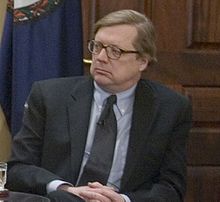David Scheffer
| David Scheffer | |
|---|---|
 |
|
| United States Ambassador-at-Large for War Crimes Issues | |
|
In office August 5, 1997 – January 20, 2001 |
|
| President | Bill Clinton |
| Preceded by | Position created |
| Succeeded by | Pierre-Richard Prosper |
| Personal details | |
| Born | September 18, 1953 |
David John Scheffer (born September 18, 1953) is an American lawyer and diplomat who served as the first United States Ambassador-at-Large for War Crimes Issues, during President Bill Clinton's second term in office. He currently teaches at the Northwestern University School of Law, where he directs the Center for International Human Rights.
Scheffer received B.A.s from Harvard and Oxford University, and an LL.M. from Georgetown University Law Center. He began his legal career at the international law firm Coudert Brothers, working for a time in their Singapore office. He also served as counsel to the U.S. House Committee on Foreign Affairs. During Clinton's first term, he was initially the senior advisor to Madeleine Albright, who then served as ambassador to the United Nations. Scheffer then sat on the Deputies Committee of the National Security Council from 1993 until 1996, and then became the first Ambassador-at-Large for War Crimes Issues.
As ambassador, Scheffer participated in the creation of the International Criminal Tribunals for the former Yugoslavia and Rwanda, the Special Court for Sierra Leone, and the Khmer Rouge tribunal. He also led the U.S. negotiating team in United Nations talks on the International Criminal Court. Though Scheffer signed the Rome Statute that established the ICC on behalf of the U.S. in 2000, he was a highly vocal critic of many aspects of the court and the negotiation process. He particularly opposed the prohibition on any party making reservations to the Rome Statute and the manner in which the Statute structured the court's jurisdiction. Clinton's successor, George W. Bush, later withdrew the signature of the U.S.
...
Wikipedia
